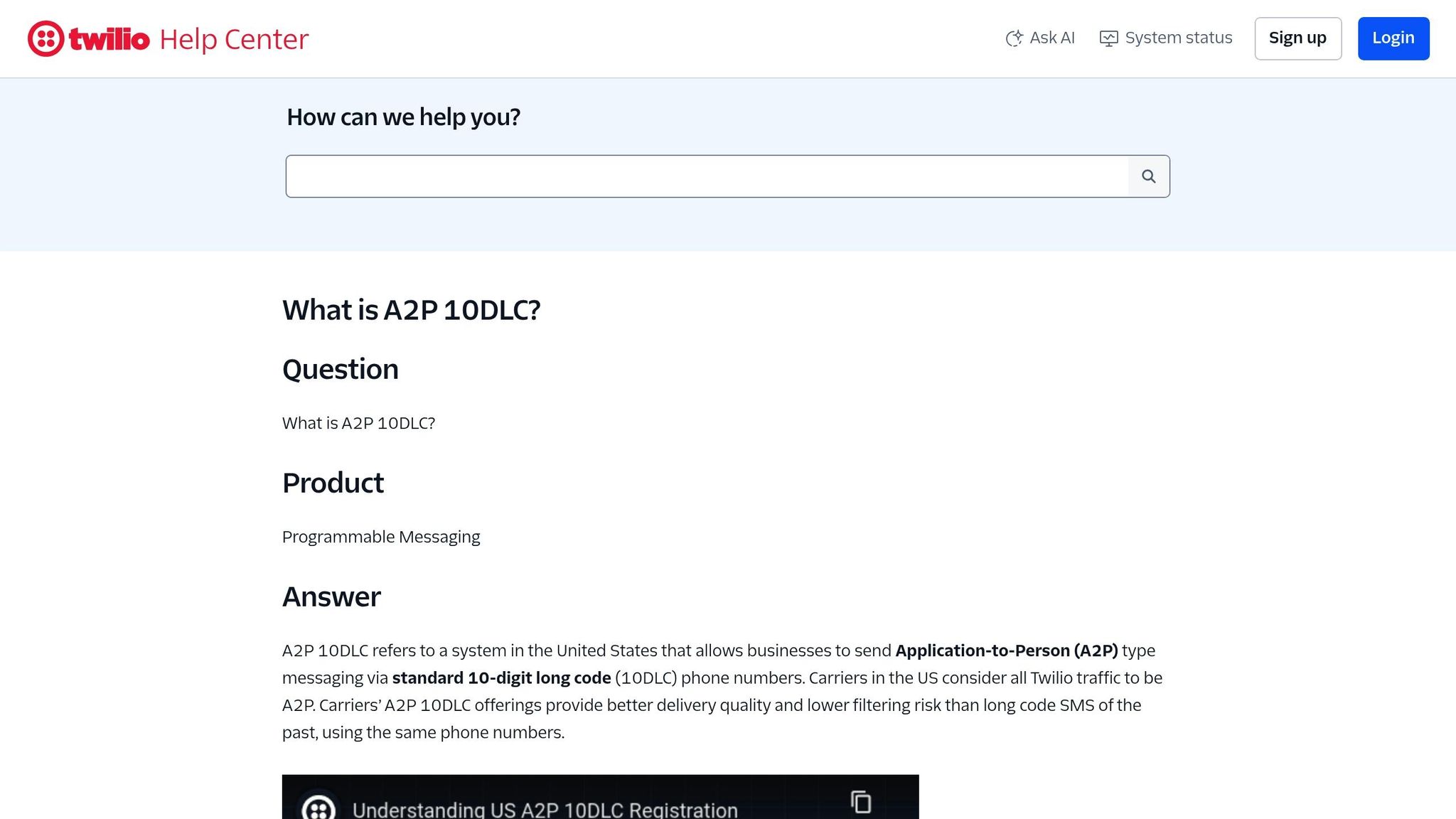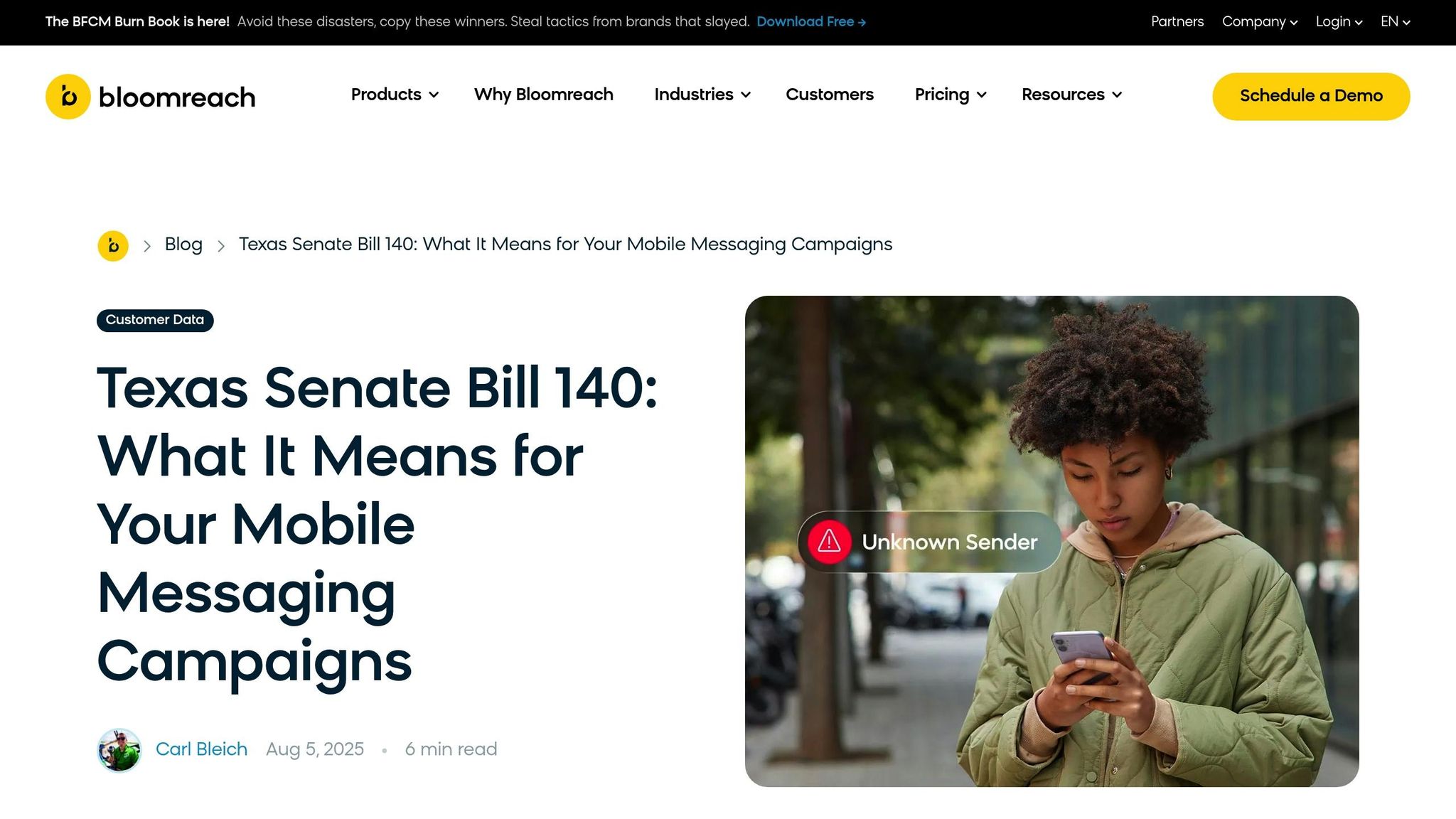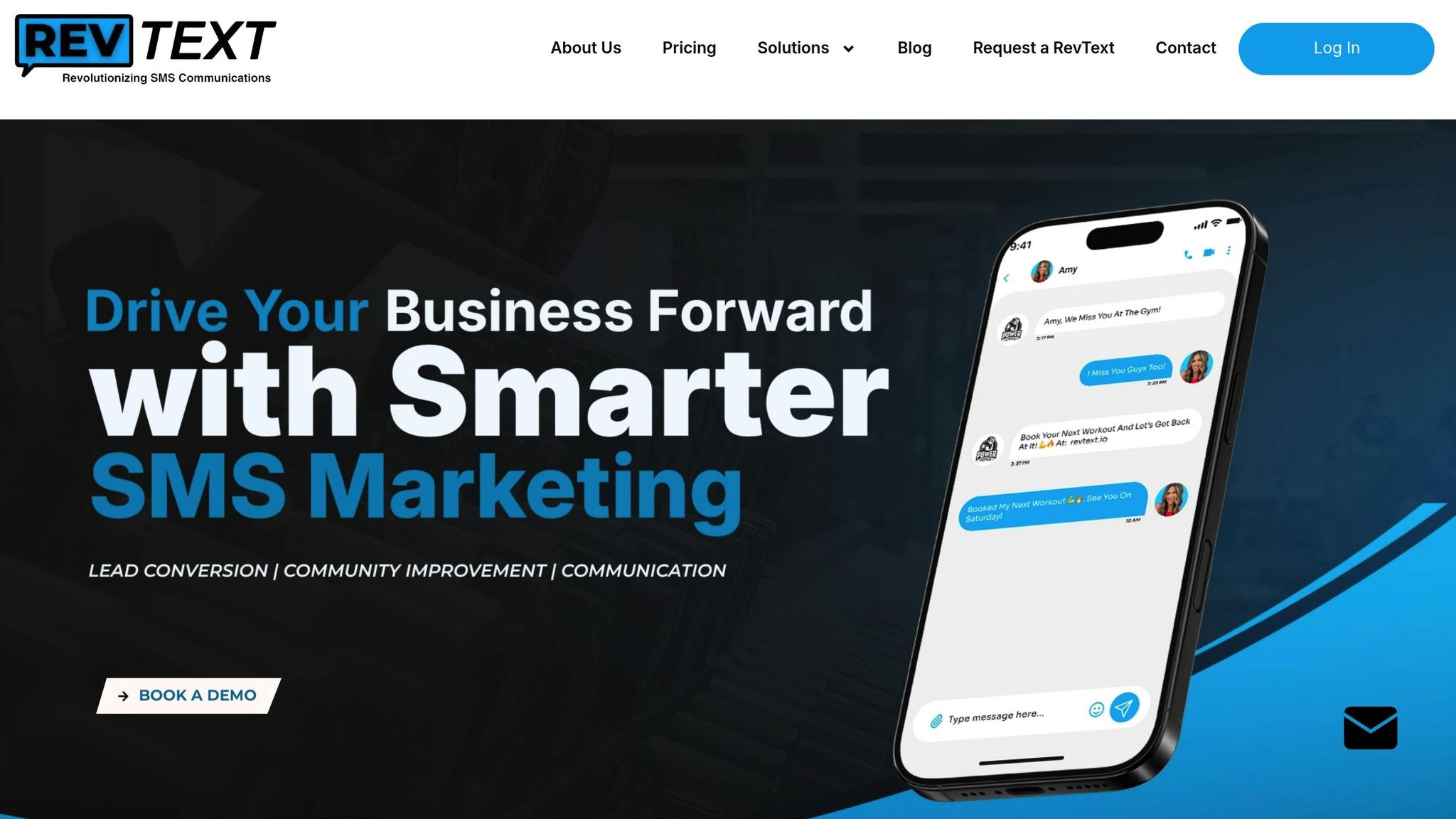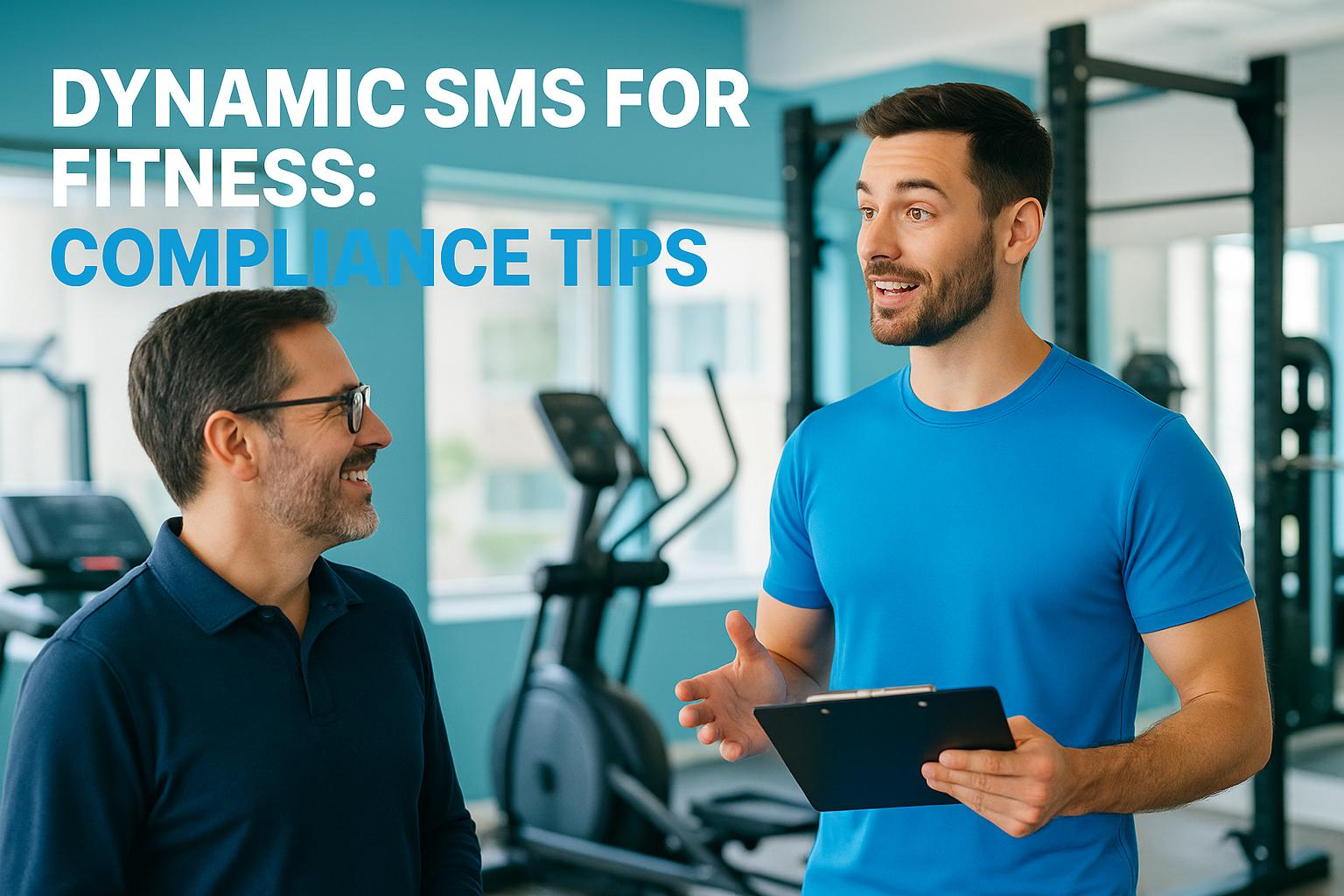Sending SMS for your gym or fitness studio? Compliance isn’t optional. Federal laws like the TCPA and new state rules, such as Texas SB-140, impose strict guidelines. Non-compliance can lead to fines ranging from $500 to $5,000 per message, blocked texts, and lost member trust. Here’s how to stay compliant:
- Get explicit opt-in consent: Members must actively agree to receive texts.
- Follow timing rules: Send messages only between 8:00 a.m. and 9:00 p.m. local time.
- Include opt-out instructions: Add "Reply STOP to end" to every message.
- Register for A2P 10DLC: This ensures better deliverability and compliance with carrier requirements.
- Avoid restricted content: Use clear, professional language to prevent messages from being flagged.
With stricter state laws like Texas SB-140, you must also pay a $200 registration fee and a $10,000 security deposit to text Texas residents. Compliance isn’t just about avoiding fines – it ensures your messages get delivered while maintaining trust with your members. Tools like RevText can simplify this process by automating consent tracking, quiet-hour enforcement, and state-specific compliance.
A2P 10DLC Registration Requirements

What Is A2P 10DLC and Why Does It Matter?
A2P 10DLC, or Application-to-Person 10-Digit Long Code, allows businesses to send SMS messages through standard 10-digit numbers. This setup improves message deliverability by reducing the chances of texts being flagged as spam. By registering your brand and campaigns with mobile carriers, you ensure your messages reach your audience while also building your gym’s credibility with the carriers. This registration can even help you handle higher messaging volumes during peak times. In essence, A2P 10DLC ensures your SMS communications are both effective and compliant with industry standards.
How to Register for A2P 10DLC
The registration process involves two main steps: brand registration and campaign registration.
- Brand Registration: This step verifies your gym’s identity. You’ll need to provide details like your legal business name, tax identification number, business address, and website URL. Depending on your setup – like multi-location or franchise gyms – review times may vary, and additional documentation might be required.
- Campaign Registration: Once your brand is approved, you’ll register the types of messages you plan to send. These could include appointment reminders, membership updates, promotional offers, or customer support messages. You’ll also need to submit sample messages for review to confirm they meet compliance rules. After approval, you’re ready to start sending messages that align with industry guidelines.
What Happens If You Don’t Register
Skipping A2P 10DLC registration can seriously impact your SMS marketing efforts. Carriers are likely to filter out messages from unregistered numbers, reducing the chance your texts will reach members. This could delay vital communications like appointment reminders or promotional updates. Additionally, unregistered numbers may face strict limits on how many messages they can send – or worse, be completely blocked. For gyms with multiple locations, a single oversight could disrupt communication across the entire brand, leading to higher costs and potential legal issues. Securing your registration is the first step; the next is staying informed about federal and state SMS laws to ensure full compliance.
Running A Successful Compliant SMS Program
Federal and State SMS Laws You Need to Know
Navigating SMS compliance involves understanding both federal regulations and state-specific laws, which can differ significantly. For gym owners, these rules dictate how you handle consent, messaging, and opt-out processes. The stakes are high – violating these laws can lead to hefty fines. And when you’re sending thousands of texts each month, even a single mistake can result in serious financial consequences. Here’s a breakdown of the key federal and Texas-specific rules you need to know.
TCPA Compliance Rules
The Telephone Consumer Protection Act (TCPA) lays out specific guidelines for businesses sending promotional or informational texts to their members. Here’s what you must follow:
- Obtain explicit opt-in consent: Members must actively agree to receive messages, whether through checked boxes, keyword responses, or written consent. Pre-checked boxes or assumed consent are not allowed.
- Send messages during appropriate hours: Messages can only be sent between 8:00 a.m. and 9:00 p.m. local time for the recipient.
- Include opt-out instructions: Every text must provide clear instructions, such as "Reply STOP to end." Once someone opts out, you must process their request promptly and stop sending further messages.
- Keep detailed records: Maintain timestamps and records of consent to demonstrate compliance.
Texas SB-140: New State SMS Rules

Starting September 1, 2025, Texas Senate Bill 140 (SB-140) introduces additional requirements for businesses operating in Texas. This law builds on the federal TCPA, adding stricter controls for promotional texts.
- Stricter documentation for promotional messages: Texts about membership deals, class packages, or referrals require detailed opt-in records, including specific consent and disclosure language.
- State-level penalties: Violations of SB-140 can result in state fines, which are applied on top of any federal TCPA penalties.
- Enhanced compliance for multi-location gyms: Gyms with locations in Texas must ensure their protocols meet these stricter state requirements while maintaining consistency for members across all locations.
TCPA vs. Texas SB-140: Key Differences
Here’s a comparison of the federal TCPA and Texas SB-140 rules:
| Compliance Area | Federal TCPA | Texas SB-140 |
|---|---|---|
| Scope | Nationwide for promotional SMS | Expands the definition of telephone solicitation within Texas |
| Penalties | Federal fines per violation | Adds state penalties alongside TCPA fines |
| Opt-in Requirements | Requires clear, active consent | Demands enhanced, message-specific consent |
| Quiet Hours | Messages allowed 8:00 a.m.–9:00 p.m. local time | Same timing restrictions |
| Opt-out Process | Must include "Reply STOP", with prompt processing | Same process, with additional state oversight |
| Documentation | Requires consent records | Requires detailed records, including message type |
| Effective Date | Ongoing federal law | Effective September 1, 2025 |
The major difference lies in enforcement. While TCPA violations lead to federal penalties, SB-140 introduces extra state-level risks for businesses operating in Texas. For gyms with locations in Texas, compliance with both sets of rules is non-negotiable.
If you’re running a franchise, adopting compliance protocols that meet the strictest standards is crucial. This not only protects your business but also ensures smooth operations across all your locations.
sbb-itb-9f7e00b
How to Create Compliant SMS Campaigns
Creating SMS campaigns for your gym isn’t just about engaging members – it’s about staying within the boundaries of federal and state regulations. By following these guidelines, you can craft messages that connect with your audience while keeping your business protected.
Include Opt-Out Instructions in Every Message
Every SMS you send must provide a way for recipients to opt out, as required by the TCPA and Texas SB-140. The standard phrase, "Reply STOP to end," should be added to the bottom of all messages – whether you’re sending a class reminder, a special offer, or a motivational note.
Your opt-out system must operate automatically and immediately. If a member texts "STOP", they should be removed from all future campaigns right away and receive a confirmation message. This process should be consistent across all gym locations. Never manually override an opt-out request, even if a member asks to receive only certain updates. Once someone opts out, they can only rejoin by actively opting in again through your established process.
Watch Out for Restricted Content (SHAFT Rules)
Carriers block messages containing SHAFT content – sex, hate, alcohol, firearms, and tobacco. Even fitness-related terms can sometimes trigger these filters.
For example, phrases like "killer workout" or "explosive training" might be flagged. Instead, use clear and positive language such as "high-intensity class" or "dynamic training session." Avoid slang, excessive exclamation points, and overly promotional language, as these can make your messages appear spammy. Phrases like "limited time only" or heavy use of capital letters can also raise red flags. Aim for a professional and conversational tone that emphasizes the value you’re offering.
Use Personalization Thoughtfully
Including personal touches like a member’s first name can make your messages more engaging, but it’s important to strike the right balance. Personalization should feel natural, not intrusive. For instance, referencing details a member has voluntarily shared – such as their favorite class type – is a great way to connect.
Stick to information provided directly by members through sign-up forms, surveys, or conversations. For example, if someone loves yoga, you might say: "Hi Sarah, we’ve added a new yoga class to the schedule!" Timing personalization also works well. A message like, "Hi Mike, your favorite 8:00 a.m. spin class has two spots left for tomorrow," feels tailored and respectful of privacy.
Lastly, ensure your personalized messages comply with quiet-hour regulations for SMS timing.
Respect Quiet Hours and Timing Rules
SMS messages must only be sent between 8:00 a.m. and 9:00 p.m. in the recipient’s local time zone. Always plan your campaigns within this window, taking into account members’ locations.
For example, if your gym offers early morning classes, send reminders no earlier than 8:00 a.m. Similarly, avoid sending promotional messages late at night when members are likely winding down. For class reminders, aim to send them 2 to 4 hours before the session starts, giving members enough time to adjust their plans while staying within the permitted hours.
Use Branded Short Links for Trust and Results
Generic link shorteners can sometimes be flagged as spam by carriers or come across as untrustworthy to recipients. Instead, use branded short links that reflect your gym’s name. These links not only improve deliverability but also encourage higher click-through rates because members recognize and trust them.
When including links to class schedules, membership offers, or promotions, pair them with clear, descriptive text. For instance: "Check out your class schedule: [branded-link]" sets clear expectations and builds trust.
For added convenience and compliance, tools like RevText offer custom link shortening features. These branded links enhance your gym’s identity, ensure reliable delivery, and allow you to track clicks for campaign performance insights.
How RevText Keeps Your SMS Campaigns Compliant

RevText simplifies compliance management for your SMS campaigns, allowing you to focus on connecting with your members instead of worrying about legal updates. The platform automates the process, ensuring your gym’s messaging stays within the rules without added stress.
Automatic Compliance Features
RevText takes the guesswork out of compliance by automating key processes. It collects explicit opt-in consent through checkboxes, keywords, or written agreements, all with timestamped records for added security. Every SMS includes the mandatory "Reply STOP to end", and opt-out requests are handled instantly.
The platform also includes quiet-hour protection. Its scheduling engine automatically prevents messages from being sent outside the federally approved 8:00 a.m. to 9:00 p.m. window, adjusting delivery times based on each recipient’s local time zone.
State-specific rules are no problem either. Take Texas SB-140, for example – it mandates a $10,000 security deposit and penalties of up to $5,000 per text for violations. RevText’s compliance engine stays up-to-date with changing regulations, even alerting you when your campaign content might run afoul of state laws.
Campaign Tools That Work
RevText goes beyond compliance by offering tools designed to boost your campaign’s effectiveness. One standout feature is branded short links, which improve deliverability and build trust. Instead of generic URLs like bit.ly, your messages can include recognizable links like "yourgym.revtxt.com/offer", making them less likely to be flagged as spam and more likely to engage your audience.
The platform also centralizes all your campaign documentation. This includes opt-in records, message logs, and delivery details – all organized and ready for export if you ever face an audit or legal inquiry. Detailed logs track every opt-in and opt-out, along with message content and consent records, giving you peace of mind.
Advanced reporting tools provide insights that go beyond basic delivery rates. You can monitor click-through rates for your branded links, analyze opt-out trends, and identify which types of messages resonate most with your audience. This data helps you fine-tune your campaigns while staying compliant.
Support for Multi-State Gym Operations
If your gym operates across multiple states, RevText’s compliance engine has you covered. It automatically adjusts campaigns to meet both federal and state-specific rules. For instance, a national gym chain can run a single campaign, and RevText will enforce Texas SB-140 requirements for Texas members while applying standard TCPA rules elsewhere.
Timing is handled just as seamlessly. The platform ensures members in different time zones receive messages at appropriate local times, maintaining quiet-hour compliance without requiring manual adjustments.
RevText’s support team is another key asset. They specialize in helping fitness businesses navigate the complexities of SMS marketing. From onboarding assistance to campaign reviews and proactive updates on regulatory changes, they’re there to guide you. When new laws, like Texas SB-140, come into play, you’ll get clear instructions on how to adapt your campaigns.
Additionally, RevText manages A2P 10DLC registration, ensuring your messages are delivered to members without being flagged as spam. This process can be tricky to handle alone, but RevText takes care of it for you, helping to maintain your sender reputation and message deliverability.
Conclusion: Why Compliance Is Critical for SMS Success
Staying compliant in SMS marketing is a game-changer for fitness businesses looking to boost member engagement. But let’s be clear: the stakes are high. Non-compliance can lead to hefty fines, with federal and state regulations imposing severe penalties for even minor violations. This makes strict adherence to compliance rules non-negotiable for every SMS campaign.
One slip in compliance can cost more than just money – it can damage trust and interrupt communication. Carriers are cracking down on suspicious messages, often blocking them outright. When messages don’t get delivered, members miss important updates, and your engagement efforts fall flat.
Trust is everything. Today’s consumers are more informed about their privacy rights than ever. Respecting their preferences – whether through proper opt-in procedures, clear opt-out options, or sending messages at reasonable hours – shows you value their time and relationship. This approach not only safeguards trust but also lays the groundwork for long-term loyalty and positive word-of-mouth.
Navigating compliance isn’t getting any easier, either. State-specific regulations are becoming increasingly complex, often going beyond federal requirements. For gym owners operating in multiple states, this creates a maze of rules to follow.
The good news? You don’t have to tackle this alone. By using platforms that handle the technical side – like A2P 10DLC registration and scheduling messages during quiet hours – you can focus on crafting campaigns that engage members and drive revenue. Investing in compliance tools and processes isn’t just about avoiding fines; it ensures your messages are delivered and your campaigns thrive.
When fitness businesses commit to compliance, they turn what could be a challenge into an advantage. By ensuring messages consistently reach members without risks of fines or blocks, you’ll see the payoff in stronger engagement and a reputation for doing things right.
FAQs
What legal risks could gyms face if they don’t follow TCPA and Texas SB-140 rules for SMS messaging?
Failing to follow the rules set by the TCPA and Texas SB-140 can have serious consequences, both legally and financially. Under the TCPA, each non-compliant message can lead to fines of up to $500. If the violation is found to be intentional, that amount jumps to $1,500 per message. For gyms that send out a high volume of texts, these penalties can quickly snowball into millions of dollars.
Texas SB-140 adds even more weight to compliance requirements. It imposes fines of up to $5,000 per violation and could even result in a Class A Misdemeanor charge. On top of that, businesses could face private lawsuits, further increasing the risks. These regulations make it absolutely essential for gyms to ensure their SMS campaigns align with both federal and state laws – not just to avoid hefty fines, but also to safeguard their reputation.
How can gyms ensure their SMS messages are delivered and remain compliant with A2P 10DLC regulations?
To make sure your SMS messages are delivered successfully and meet A2P 10DLC compliance standards, start by properly registering your business and campaigns. This step helps prevent your messages from being flagged as spam. Always secure clear opt-ins from recipients and include opt-out instructions, such as “Reply STOP to end,” in every message. Also, stick to sending messages during appropriate hours – usually between 8 a.m. and 9 p.m. local time.
When crafting your messages, aim for personalization and relevance, steering clear of spammy language or content that might get caught by carrier filters. Using branded short links instead of generic ones can not only enhance deliverability but also give your messages a polished, professional look. Following these practices will help keep your SMS campaigns both effective and compliant.
How can gyms stay compliant with SMS regulations across different states, including Texas?
To stay compliant with SMS regulations across different states, gyms must adhere to federal laws like the TCPA. This includes obtaining clear opt-in consent from recipients, providing opt-out instructions in every message, and limiting messages to appropriate hours – typically between 8 a.m. and 9 p.m. local time. On top of this, gyms should also monitor state-specific rules, such as Texas SB-140, which adds stricter limits on promotional texts and stresses the need for thorough opt-in documentation.
Using a platform that incorporates compliance tools, automates the opt-in process, and offers guidance tailored to state regulations can simplify this process. It also helps gyms avoid potential fines while keeping their messaging practices in line with the law.




